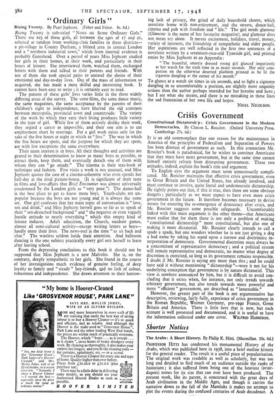Crigis Government
IT is an old commonplace that one reason for the maintenance in America of the principles of Federalism and Separation of Powers has been distrust of government as such. In this connection Mr. Rossiter's book is paradoxical, for he wishes to convince Americans that they must have more government, but at the same time cannot himself entirely refrain from distrusting government. These two attitudes, indeed, explain the book's title and argument.
To English eyes the argument must seem unnecessarily compli- cated. Mr. Rossiter maintains that effective crisis government, even in Great Britain and the United States, has already involved, and must continue to involve, quite literal and undemocratic dictatorship. He rightly points out that, if this is true, then there are some obvious dangers ; particularly as we must expect to have even more crisis government in the future. It therefore becomes necessary to devise means for ensuring the re-emergence of democracy after crisis, and Mr. Rossiter suggests some possible safeguards. Uncomfortably linked with this main argument is the other theme—that Americans must realise that for them there is not only a problem of making "constitutional dictatorship" more constitutional, but also one of making it more dictatorial. Mr. Rossiter clearly intends to call a spade a spade, but one wonders whether he is not just giving a dog a bad name by taking his stand upon a narrow and doctrinaire in- terpretation of democracy. Governmental discretion must always be a concomitant of representative democracy ; and a political system will remain representative and democratic, no matter what degree of discretion is exercised, so long as its government remains responsible. I doubt if Mr. Rossiter is saying any more than this ; and he could have said it without mentioning "dictatorship "—were it not for his underlying coneeption that government is by nature dictatorial. This view is nowhere announced by him, but it is difficult to avoid con- cluding that it exists when, for instance, not only trends towards arbitrary government, but also trends towards more powerful and more " efficient " government, are described as "lamentable."
However, the greater part of the book is not argumentative but descriptive, reviewing, fairly fully, experience of crisis government in the Roman Republic, Weimar Germany, pre-194o France, Great Britain and America. There is little here that is new, but each account is well presented and documented, and it is useful to have the information collected under one cover. WILFRID HARRISON.


































 Previous page
Previous page